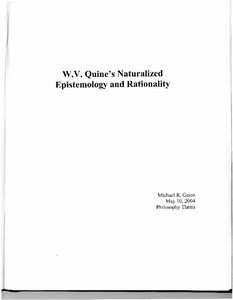| dc.rights.license | In Copyright | en_US |
| dc.creator | Gaico, Michael Razvan | |
| dc.date.accessioned | 2023-10-20T18:01:14Z | |
| dc.date.available | 2023-10-20T18:01:14Z | |
| dc.date.created | 2004 | |
| dc.identifier | WLURG038_Gaico_thesis_2004 | |
| dc.identifier.uri | https://dspace.wlu.edu/handle/11021/36499 | |
| dc.description | There is an error in pagination -- the last page should be 48 rather than 47. | en_US |
| dc.description.abstract | My aim in this essay is to portray Quine's naturalized epistemology, despite its points of departure from traditionalist rationalist and empiricist epistemologies, as a viable theory of knowledge. I will conclude by discussing the altered understanding of rationality that emerges from Quine' s account. In Chapter 2, I will discuss how Quine's epistemology entails a rejection of the a priori/a posteriori distinction. More specifically, I will discuss how his repudiation of the language/theory dichotomy effects this rejection as it identifies the basic empirical origin of all
linguistic and theoretical acts. Furthermore, I will highlight Quine's particular rhetorical treatment of the notion of "intuition," as it implies a priori rational intuition. In subsequent parts of this essay, I will refer often to the views outlined in this chapter, as they are the basis for understanding Quine's motivations in developing his account of naturalized epistemology. I will go on in Chapter 3 to consider the opposing traditionalist foundationalism of Laurence BonJour. I will use his account to explicate the conception of a priori insight that Quine rejects. Furthermore, I will use BonJour's account to illustrate how Quine's epistemology differs wholly from that of the prototypical empiricist as well as of the prototypical rationalist. I
will portray traditionalist epistemologies as foundationalist in terms of the concern with the
normative requirement of linear propositional support. I will characterize Quine's antifoundationalism
in terms of his flouting of this requirement by advocating the concept of
reciprocal containment.
Chapter 4 will ultimately identify the issues of normativity and justification as specific
points of departure of Quine's account from traditionalist ones. I will begin first by considering
Laurence BonJour' s direct arguments against naturalized epistemology, and then move toward
offering a Quinean counter to these arguments. In the process, I will depict the hypothesis
formation and testing process of science that naturalized epistemology seeks to clarify and
improve. In terms of this purpose of clarification, I will show how Quine's account offers a
viable theory of knowledge that more accurately captures the nature of human belief.
Finally, in Chapter 5, I will discuss the view of rationality that is suggested by Quine's
account and as it emerges out of my preceding characterization of naturalized epistemology. [From Introduction] | en_US |
| dc.format.extent | 50 pages | en_US |
| dc.language.iso | en_US | en_US |
| dc.rights | This material is made available for use in research, teaching, and private study, pursuant to U.S. Copyright law. The user assumes full responsibility for any use of the materials, including but not limited to, infringement of copyright and publication rights of reproduced materials. Any materials used should be fully credited with the source. | en_US |
| dc.rights.uri | http://rightsstatements.org/vocab/InC/1.0/ | en_US |
| dc.subject.other | Washington and Lee University -- Honors in Philosophy | en_US |
| dc.title | W. V. Quine's Naturalized Epistemology and Rationality | en_US |
| dc.type | Text | en_US |
| dcterms.isPartOf | WLURG038 - Student Papers | en_US |
| dc.rights.holder | Gaico, Michael Razvan | en_US |
| dc.subject.fast | Quine, W. V. (Willard Van Orman) | en_US |
| dc.subject.fast | A priori | en_US |
| dc.subject.fast | Justification (Theory of knowledge) | en_US |
| local.department | Philosophy | en_US |
